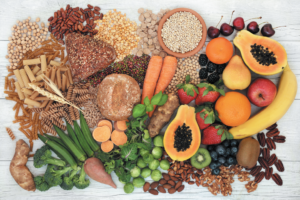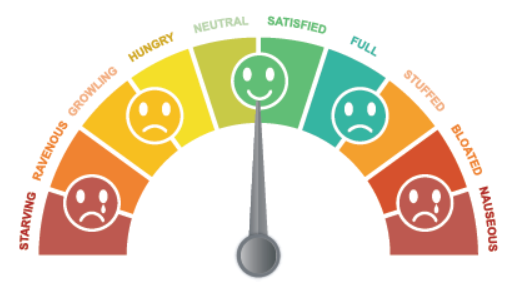Hunger matters: research suggests we have an easier time eating less if we feel less hungry. Scientists have learned a lot in recent years about the physiological factors involved in hunger, and about how what we eat interacts with our body’s hunger and satiety systems (satiety is the feeling of being fully satisfied). “Importantly,” says Dariush Mozaffarian, MD, DrPH, dean of the Friedman School and editor-in-chief of Tufts Health and Nutrition Letter, “our food choices also influence many of the unconscious biologic pathways that drive eating and weight gain, which together appear to be even more important than conscious sensations of hunger and satiety.”
The body has a number of feedback mechanisms that control hunger, satiety, and appetite. For example, the hormone ghrelin is released when the stomach is empty, signaling the brain we need food. When we start to lose weight, ghrelin levels begin to rise, so we may feel hungrier when we’ve lost weight. Other hormones (with names like GLP-1 and peptide YY) also influence appetite. Levels of these hormones tend to decrease with weight loss, so we may not feel satiated as long as we normally would after eating. “Fortunately, there are some dietary changes we can make that may help manage this hormonally-induced hunger,” says Jillian Reece, RDN, CSOWM, clinical bariatric dietitian at Tufts Medical Center.
Protein. Results of studies on the impact of protein intake on hunger have varied, but the overall feeling of many experts is that, in many people, protein can be helpful in hunger regulation. “Some research suggests that, compared to fats and carbs, protein does a better job suppressing ghrelin,” says Reece. “This doesn’t mean we should excessively eat protein. Just include a protein source with each meal—and aim to spread it out fairly evenly throughout the day.” The typical American diet is heavy on protein at dinner, and light at breakfast. Reece recommends Greek yogurt, cottage cheese, eggs, and nut butter or nuts as quick and easy ways to increase protein in the morning meal.
Richard Siegel, MD, co-director of the Diabetes Center and a physician at the Weight and Wellness Center at Tufts Medical Center recommends eating “adequate protein and plenty of fiber as natural appetite suppressants.”
Fiber. Minimally processed, higher fiber foods may help keep hunger at bay. “Research shows that people report feeling less hungry after consuming foods naturally high in fiber, such as whole grains, fruits, and vegetables,” says Nicola McKeown, PhD, associate professor at the Friedman School. As Siegel explains, “it seems fiber may stimulate GLP-1 from the gut, which can inhibit appetite in the brain.”
Different food sources of fiber may promote different degrees of satisfaction. “Soluble fiber, especially, helps to increase feelings of fullness/satiety,” says Reece. “It essentially packs the stomach, so we feel full. It also slows the movement of food through the GI tract, which helps us feel satisfied.” All fruits, vegetables, whole grains, and legumes contain some soluble fiber, but beans, oats, barley, citrus fruits, and apples are some top sources.
Choosing whole grains or minimally processed whole grain foods, such as steel cut oats or breads made with larger pieces of grain, may help you feel more satisfied compared to eating the same amount of a refined grain. “This is because some whole grains are coarser and take longer to digest,” McKeown explains. “Whole grains, such as oatmeal and barley, also blunt spikes in blood sugar, which helps to control hunger.”
“Another benefit to naturally high-fiber foods is that they take longer to chew and therefore slow down our eating,” says Reece. “It’s much easier to wolf down a bag of chips or a breadstick or gulp a sugar-sweetened beverage than work through an apple, carrot sticks, a salad, or a bowl of whole grain, bran-based cereal.”
Fats. The influence of fats on hunger and satiety remains uncertain. “In trials of very high fat diets, people reduced their calorie intakes and lost weight,” says Mozaffarian. “Whether this is a benefit of higher dietary fat, the reduced refined carbohydrates and sugars, or both, is not yet clear.” The recent European SATIN (Satiety Innovation) randomized trial found that higher blood levels of linoleic acid (an omega-6 fat from plant oils) was associated with lower self-reported hunger during weight loss. “The implications of this finding need more study,” Mozaffarian cautions. Major sources of linoleic acid include plant oils like soybean and corn oils.
Foods like nuts, seeds, nut butters, avocados, seafood, and plant oil-based dressings over salads or veggies provide healthy unsaturated fats along with other nutrients (and—for many of these foods—fiber) and these foods can be part of a healthy weight-loss plan.
Other Factors. We can also capitalize on other factors involved in appetite regulation while trying to lose weight and keep it off. These include the volume of food we eat, how much we move, and psychological factors that affect appetite.
- Calorie density: According to the Centers for Disease Control and Prevention, research suggests people feel full according to the amount of food they eat (volume), not the number of calories they take in. Fill your plate with foods high in fiber (like fruits, vegetables, beans, and whole grains) to get fewer calories per bite.
- Physical Activity: In one recent clinical trial, participants did not report being hungrier and did not eat more food at lunch after engaging in either aerobic or resistance exercise after breakfast compared to when they were sedentary. But, overall, results of studies on the impact of physical activity on appetite are mixed.
“Often, when people begin a program of regular physical activity there are small increases in energy intake that may offset calories burned unless calorie intake is being purposefully restricted,” says Roger Fielding, PhD, associate center director of the HNRCA and lead scientist for the Nutrition, Exercise Physiology, and Sarcopenia Team. “This may be why we find that simply exercising does not lead to much weight loss.” But, even if it does not help control your appetite, there are benefits to being active while trying to lose weight. “In addition to decreasing cardiovascular risk factors and increasing aerobic fitness, a combination of aerobic activity and resistance exercise helps to ensure the weight you lose is fat, not muscle,” says Fielding. “Plus, most trials show that people who couple physical activity with intentional reduction in energy intake are better able to maintain weight loss.”
- Psychology and Behavior: “Hunger is complex,” says Siegel, “and we eat for many reasons besides biological hunger. It’s important to try to distinguish between ‘stomach hunger’ and ‘mind hunger,’ though they usually merge together.” While some psychological factors (such as eating when we are sad or stressed) can sabotage our efforts to make healthy choices or eat fewer calories, we can capitalize on others. “If you have a variety of high calorie processed junk foods around, you’re more likely to be tempted by them,” says Reece. “But the same rule applies to fruits, vegetables, and lean proteins. The more healthy food options you have on hand the better.” Putting food on a smaller plate is another useful trick: the same amount of food is more satisfying when eaten from a full small plate than a half-empty large plate.
Eating slowly and not skipping meals are also helpful behavioral strategies. “It takes about 20 minutes for gut satiety hormones to increase after a meal,” says Siegel. “If we eat quickly, we may not give our bodies time to tell us we are full. Slowing down the pace of eating might therefore help with weight loss.” Low blood sugar from skipping meals triggers hunger and encourages poor choices. “The hungrier we are, the higher the chance we act on impulse,” says Reece. “We’re more likely to grab a convenience food or crave sugar or refined carbs to get our blood sugar back to a normal range.”

Image © marilyna | Getty Images
What to Do. While some food components may favorably impact our appetites and help with weight control, healthy fats and naturally fiber-rich foods also improve our body’s metabolism and the health of our gut bacteria—whether we lose weight or not. A recent study demonstrated that individuals who consumed minimally processed foods over a two-week period unconsciously ate fewer calories and slowly lost weight. In contrast, when these same individuals were provided a diet high in highly processed packaged foods they unconsciously ate more calories and slowly gained weight. Examples of ultra-processed foods include breakfast cereals, energy bars, fast foods, packaged soups, and frozen pizzas or dinners. “If you’re trying to lose weight,” says McKeown, “avoid highly processed foods. Fill your fridge and freezer with fruits and vegetables, and stock your cupboards with dried and/or canned legumes and minimally processed grains such as whole oats, quinoa, brown rice, millet, and barley.”
























